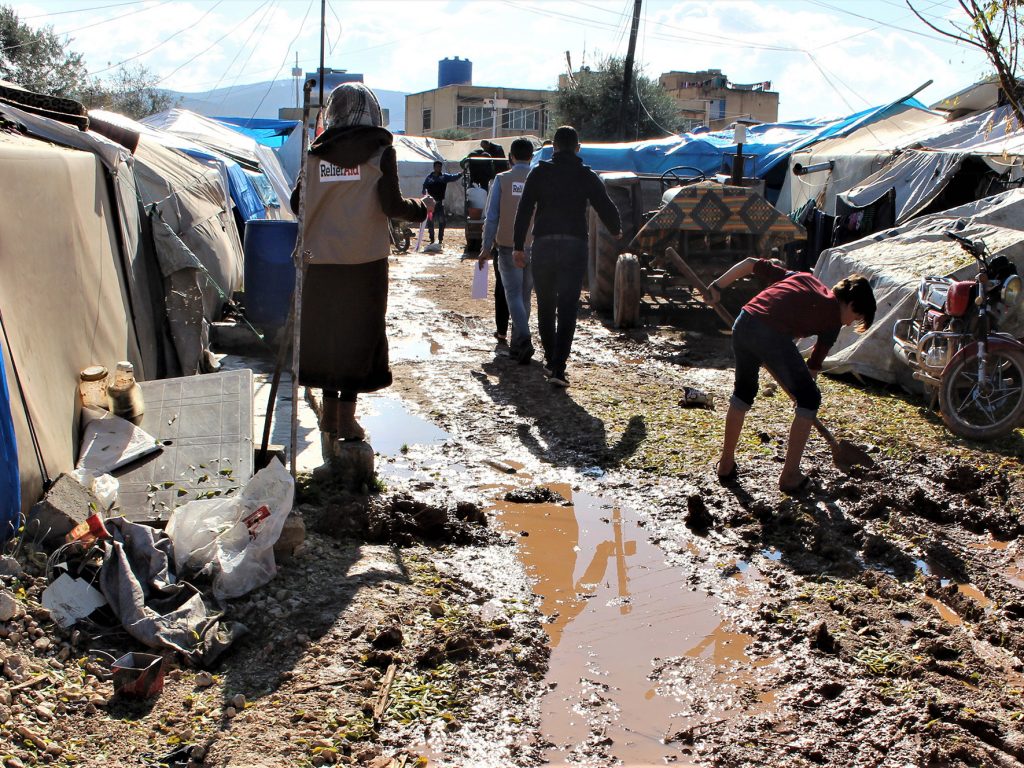ShelterBox is fearful for 300,000 residents completely cut off from aid

Aleppo – child with destroyed cityscape background
Syrian Government and rebel forces are locked in conflict over the divided city of Aleppo, with essential aid lifeline the Castello Road now impassable. An estimated 300,000 civilians, 60% of them women and children, are caught in the crossfire with dwindling supplies of food and water.
In a volatile and fast-changing situation, Syrian rebel fighters are continuing their assault on government-held districts of Aleppo after troops cut their only route into the divided northern city.
Aleppo is now effectively partitioned, with much of the west of the city held by Syrian Government forces, while rebel troops occupy the east. Attempts by rebels to re-open the arterial Castello Road, the only route to the east and the last remaining aid lifeline, have failed.
Stephane Dujarric, spokesman for UN Secretary general Ban Ki-Moon, says, ‘An estimated 300,000 people residing in eastern Aleppo city depend on the (Castello) road, which allowed the flow of humanitarian supplies, commercial goods, and civilian movement. We continue to receive distressing reports of aerial bombardment and shelling on civilian locations in both western and eastern Aleppo city.’ He has called for the ‘rapid, safe and unhindered evacuation of all civilians who wish to leave.’ But all exits are now blocked.
Aleppo is Syria’s largest city, its financial and industrial hub. Of enormous historical significance, it is one of the oldest continuously-inhabited cities in the world. Now vast areas lie in ruins, and without utilities and infrastructure much of it is uninhabitable.
Attacks against areas of eastern Aleppo have continued unabated, with civilians indiscriminately killed and injured, and there are warnings of humanitarian workers being targeted. The UN’s Office for the Coordination of Humanitarian Affairs reports that, ‘hundreds of mortars and projectiles were launched on western Aleppo. From 8 to 11 July, 57 people were reportedly killed including 15 children and 497 were injured.’
The BBC’s Middle East Analyst Diana Darke describes this as ‘Syria’s end game’ adding that ‘Aleppo is no stranger to sieges – there have been at least eight recorded across its turbulent history. But this one promises to last longer than all the others put together.’ In recent days it has been reported that military targeting of water supply networks is now a daily occurrence. When the water pumping station at Al-Khafsah in Aleppo failed, cutting off water supply to half of the city, there was panic and chaos, with people resorting to drinking from puddles in the streets.
Charity Save the Children says that hospitals and schools are also being attacked, with at least nine medical facilities bombed in the past week in Aleppo and Idlib. It warns that the whole of Northwest Syria is on the verge of a humanitarian catastrophe.
ShelterBox has been providing aid to Aleppo for many months via distributing partner charities – London based Hand in Hand for Syria and New Zealand based ReliefAid. Consignments of 4,000 Shelter Kits, containing a variety of essential items such as jerry cans, mats, solar lamps, tarpaulins, mosquito nets, kitchen sets, and water purification equipment, have been delivered by ReliefAid over the last 6 months, 1,500 of them just before the Castello Road closed.

Aleppo Relief Aid warehouse
ShelterBox partners ReliefAid say that there are already fuel shortages in eastern Aleppo, critical because so many people and businesses rely on generators for power.
ReliefAid Executive Director Mike Seawright also noted, ‘In addition the price of food and other basic commodities essential for daily living have sky-rocketed overnight. Families already suffering acute food shortages are left wondering how they will put food on the table.’
ShelterBox Operations Team Lead Alice Jefferson says, ‘We are glad to have been able to place aid very recently into eastern Aleppo via our partners ReliefAid, part of an inward flow over many months. But now with all aid routes cut off it is hard to see what the next step can be.’
‘Hundreds of thousands of civilians are trapped in areas that are being bombarded, and no-one can tell how long essential supplies of food and water will last. ShelterBox and its in-country partners are ready to deploy again as soon as humanitarian access is granted.’
Five years of war in Syria have claimed the lives of more than a quarter of a million people. Millions have fled the conflict, but nearly 18 million people still live in the war-torn country. The United Nations estimates more than 6 million of them are classed as ‘internally displaced’ after being forced to flee their homes to look for safer places to live. Most have fled the cities to seek shelter in the countryside.
ShelterBox has provided tents, shelter kits, clothing and educational equipment, both inside Aleppo, and in displacement camps within Syria and refugee camps in neighbouring countries including Iraq Kurdistan, Jordan and Lebanon. ShelterBox’s Operations team is monitoring the latest developments, and is in touch with colleague organisations on the ground in Syria.
You can help by donating to our Syria Refugee Appeal

























